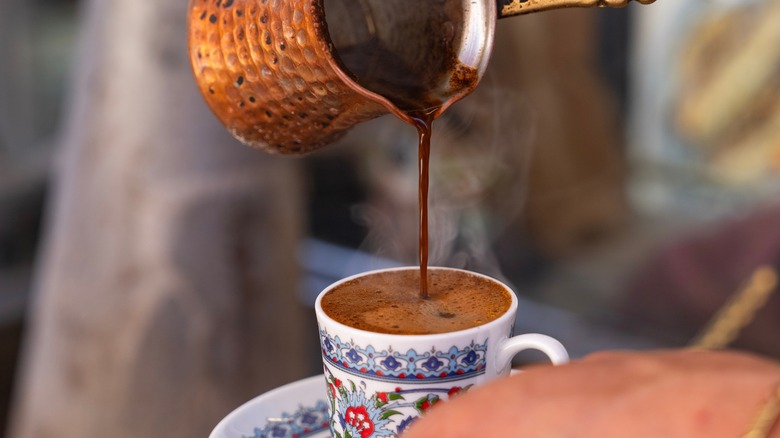Why You Should Never, Ever Stir Turkish Coffee
There's certainly an allure to Turkish coffee (which is different than Greek coffee). After all, Turkey has played an integral part in coffee's history. Much of its appeal is also due to the elaborate process of making it, which involves using a tall metal cup with a long handle, called a cezve in Turkish, to slowly brew finely ground coffee beans over low heat.
Sugar, spices, and milk are sometimes added before brewing — and this is the only point when you should add them — not as it heats or after the coffee has been poured. This is because stirring Turkish coffee will cause the drink, which is known for being boldly flavored, to become muddied and harsh.
Rather than filtering the grounds like Alton Brown does with his go-to gadget for the perfect cup of coffee, making Turkish coffee doesn't call for separating the ingredients in the cezve. Instead, you pour the coffee, grounds and all, into a fincan, a small demitasse/espresso-like cup. The grounds then need time to settle to the bottom. Sugar or other extras aren't added at this point because stirring would require a whole new start to the settling process.
Turkish coffee is unfiltered and has a slight foam on top
As Turkish coffee brews, a thick foam forms, and you're meant to remove the cezve from the heat and gently spoon it out into the fincan. Then, you return the cezve to the flame, slowly heat it until it starts to foam again, and carefully pour the rest of the coffee into the fincan, keeping the foam in the cup intact. Stirring hinders the foam's formation, which can negatively affect the taste and consistency of your cup.
In many ways, the most beautiful part of the process is the time needed for the grounds to settle to the bottom of the fincan, which opens a natural space to savor the coffee's warmth and aroma while socializing. So, when drinking this history-laden brew, please don't make a rookie culinary and cultural mistake: Never, ever stir Turkish coffee during brewing or once poured.

